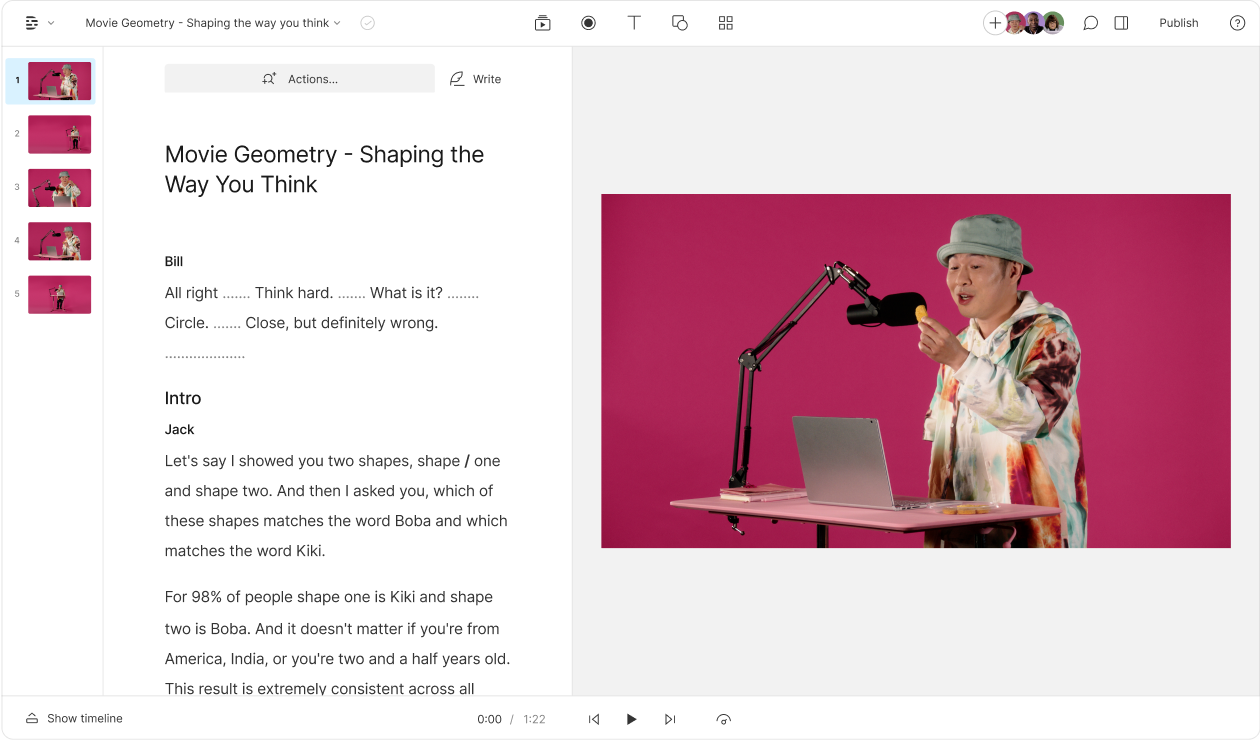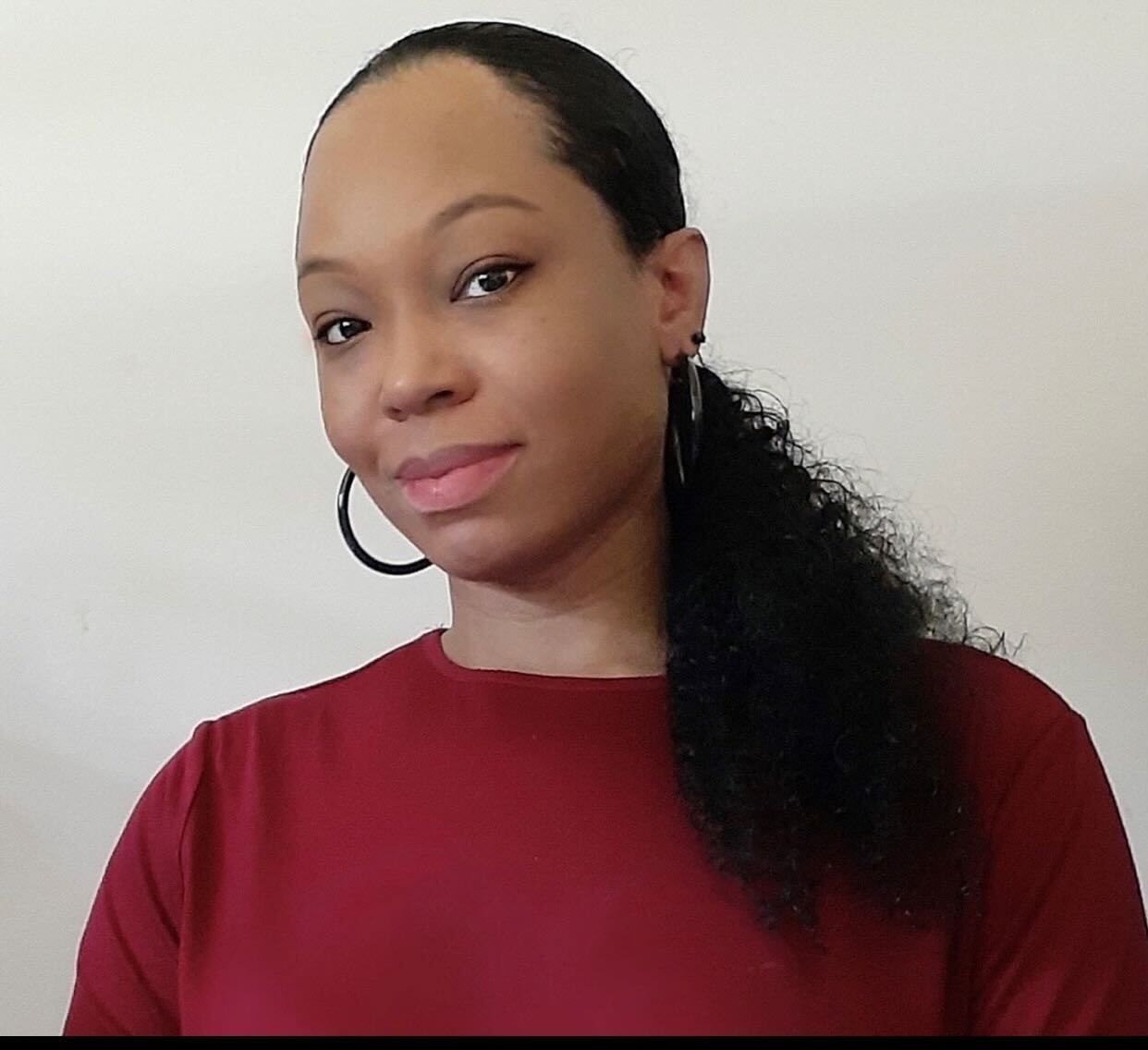What type of content do you primarily create?




The latest podcast stats show over two million new podcasts have been launched since 2020.
With so many great podcasts, it can be tough to find ways to make your show stand out.
You can make sure it’s got a cool name, an eye-catching logo, and outstanding audio, but above all, it’s got to be something people want to listen to — and that means booking great guests. A guest can make or break a podcast episode — and, in extreme cases, even the whole show.
My colleague Ashley Hamer, the former host of Curiosity Daily and Descript’s Managing Editor, recalls the time her show booked the most renowned expert in the science podcast world. The interview went well, and the guest talked up Curiosity Daily on their own podcast. A year later, people were still telling Ashley they found her podcast through that single guest.
So how do you nab that big name, that guest who will deliver insightful or entertaining content and a built-in audience? Here are a few ideas.
Where to find podcast guests
If you want to book great guests without going on a wild goose chase, you can tap your personal network, search online communities, or try specialized aggregator platforms like PodMatch, Matchmaker.fm, or PodcastGuests.com.
If you're stuck in a podcast guest rut or need help finding the right guest for your show, there are a few places to look.
1. Use your own network
Start with the basics. Think about who among your friends, acquaintances, or colleagues would make excellent potential guests for your podcast.
Just remember that your listeners come for valuable insights first. Bring in friends or colleagues from your network who can speak directly to your show’s theme. It’s fine to share some personal moments—listeners appreciate genuine chemistry between host and guest—but a quick anecdote beats a spiral into inside jokes and tangents. Keep it relevant, and you’ll let your listeners in on your bond without leaving them feeling left out.
2. Search on Google
And don’t limit your clicks to the first page of results. Going down rabbit holes by hopping from one website to another can turn out to be very fruitful.
You never know when you might stumble on an obscure conference whose keynote speaker knows a lot about what you want to cover, or the curator of an exhibition for a 19th-century artist that you want to talk about.
If you have a specific idea for what you want to discuss, you can look at your favorite publications or the articles you’re using for research to see who’s writing about the topic and who’s been interviewed on the topic.
Use specific keywords related to your podcast's topic, such as "leading cybersecurity expert," like in the example below.

Example of finding guests on search engines
You can do this for any industry. For example, the phrases “top chefs in New York” or “climate change scientists” will show a list of top contenders for your podcast, too.
Look through the results for names of potential guests. Be open to poking around the internet and sending out a few cold emails — people are often flattered to be invited on a podcast as an expert. Plus, working with a big industry name is excellent for podcast promotion.
3. Browse online communities
Browsing Facebook Groups, subreddits, or Discord channels can be a great way to find a potential podcast guest. These communities are often built for uniting people who are interested in a particular topic, making them great if you’d like to cover something a bit niche.
To find a good podcast guest in these forums, you can start by looking for the group’s administrator. If they started the digital community, they might be seen as a thought leader in the group. You can also look through posts to see who the frequent contributors are.
4. Search creator platforms
Social media platforms that emphasize video, like YouTube, TikTok, and Instagram, often attract very personality-driven content creators. This can help you assess if an influencer you’d like to interview is a compelling speaker and whether they’d be a good fit for you and your show. In essence, the content they make allows you to vet them before inviting them onto your show.
5. Explore professional platforms like LinkedIn
LinkedIn is where people tend to put their best foot forward and talk about their accomplishments — it’s for professionals and people looking for a job, after all. This means that sometimes, the perfect expert or practitioner for your podcast is practically handing themselves to you on a silver platter.
Say you were looking for a guest for your writing podcast, Erica Schneider would be a great fit.

Why? Well, she has a big audience of over 20,000 followers. That’s big for getting eyes on your episode after it’s published. Plus, if you look at the content Erica posts, you can see she knows her stuff, which is exactly what you’re looking for when finding a new guest.

Many people use Twitter in the same way and tout their latest article, book, or TV appearance. Twitter is also a great place to identify those who are the most plugged in on a discussion or topic you’d like to cover. You can find new accounts by looking at who’s retweeting posts or articles you like.
6. Find PR mailing lists
Publicists are always trying to promote their clients — it’s their job. If there’s a PR firm that specializes in your area of interest, sign up for their listserv or newsletter.
A smart strategy for finding good guests is to get on PR mailing lists for book publishers, which will tell you who has new books coming out. You can also check the book review sections of newspapers or publications like Kirkus Reviews, as well as the publishing announcements on Publishers’ Weekly and Amazon’s “Coming Soon” section.

“Coming Soon” section on Amazon
Authors and their publicists want to promote their work and often go on radio programs, TV shows, and podcasts to talk about their new books.
6. Find PR mailing lists
While their writing may be dense, academics will know a ton about your topic at hand, and can be pretty passionate about it. Look for research about your topic on Google Scholar or JSTOR.
You can also look to academic forums like TED Talks or recorded lectures. The author list of academic papers often include the email address of the lead author, and for other authors, you can Google their name and university to find their contact information.
7. Read academic articles
8. Talk to other podcast hosts
9. Use a podcast matchmaking service
There are a number of services whose sole purpose is to match podcasts with guests. Ashley warns that some can feel like a random grab-bag, but many offer helpful tools to narrow your search. For instance, PodMatch says it “helps the right podcast guests & hosts find each other faster and automates administrative work, so you can focus on what matters: recording interviews that serve listeners.” Matchmaker.fm provides a large directory of categories and an integrated messaging system, while PodcastGuests.com features a searchable directory of experts by specialty.

Finding podcast guests on Matchmaker.fm
There’s real value in these services. Many send out weekly lists of guests who are eager to appear on podcasts. If you’re willing to sift through a few unfit pitches, you’ll often find guests who have compelling stories and serious expertise.
Here are a few websites to find great podcast guests:
- Matchmaker.fm
- Podmatch
- Podcastguests.com
10. Attend events
Attend events related to your podcast's theme. For example, if you run a beauty and fashion podcast, go to local fashion shows and events, and you may meet potential guests.
You never know who you’ll meet when you put yourself out there. Someone you meet may know a friend who’d love to be on your podcast and can hook you up with them there.
11. Crowdsource from podcast listeners
This is an overlooked, but incredibly valuable way to build a guest list.
Ask your listeners who they would like to hear on the podcast. Getting listeners' thoughts gives them a sense of involvement and can lead to higher engagement. Any podcast can do this through social media or an email newsletter.
11. Crowdsource from your listeners
12. Contact professional associations
13. Get referrals from past guests
Want to cut down your cold outreach time? Ask previous guests if they can recommend others who might be interested in appearing on your podcast.
This gives you a warm intro to potential guests who are reputable and vetted. If they are good friends with your guest, they probably already know of your podcast and will be excited to join.
14. Join mastermind groups
Joining or forming mastermind groups in your podcast's industry can give you access to experienced professionals who could serve as potential guests. Say you’re running a business podcast, you can join a mastermind group like Entrepreneur’s Organization (EO) or Business Network International (BNI) to find guests, and learn some new stuff along the way.
Tips for booking the best podcast guests
Whether you’re starting a new podcast or running another season of your current one, keep the following tips in mind.
Identify the right podcast guest
Ashley’s rule of thumb: “A podcast guest serves your show by being interesting to your audience or by having a large audience of their own that they can tell about your show — preferably both.” You might think that’s obvious, but it’s worth noting, because both elements are crucial.
Identifying your ideal guest should start in the show conception phase, before you've published an episode. “If you have a strong theme and point of view for your show, the right kind of guest will be obvious,” Ashley says. “The less specific your show topic, the harder it'll be to decide on a guest.”
Ask yourself what you want your listeners to get out of the show. Some questions you might ask:
- Do I want the audience to get a new way to look at the world or a deeper insight into a topic? If so, your best bet might be an expert — a professor, a journalist on the beat, or an author of a book on the subject.
- Do I want to provide my listeners with some advice, whether it's about using retinol in their skincare or getting more out of their relationships? If so, a good idea would be to go with a practitioner in the field, like a doctor or a therapist.
- Do I just want to entertain my listeners? With a lively or funny discussion of whatever genre or topic I’m focused on, for example? Think about who you could chat with for hours, but who would also be interesting to your audience. Maybe it’s a comedian or a YouTuber who clearly has the gift of gab.
Vet your podcast guests
So you’ve identified someone who has an interesting take and who is a good fit for your podcast. You should still vet them thoroughly to make sure they’re really going to make a good guest. A good guest can give your podcast a huge boost. A bad guest who isn’t charismatic or who doesn’t know as much as they say they do will cause you a lot of headaches and may detract from your credibility with listeners.
Ashley hosted a science show and early on, her cohost booked an interview with a guest who shared information that they later found was 75% scientifically inaccurate. “Ideally, we wouldn't have run the interview at all,” she recalls. “But we were still getting our bearings and guests were hard to come by.” So they ended up cutting large chunks of the conversation and inserting disclaimers next to the remaining inaccuracies. The lesson: do the research to be sure the person you’re booking knows what they’re talking about.
And beyond checking your guest’s credentials, check that they’re going to make for great content. Look at YouTube videos or listen to other podcasts they’ve done — are they fun to listen to? If they’ve never been on a podcast before, try to arrange a pre-interview: a short informal chat to talk about potential podcast interview questions to answer if they come on your show. You can offer a few sample questions or try to have an organic conversation with them. This will help you suss out if they’ll do well on the show.
Invite guests the right way
Once you’ve found a high quality guest for your show, and vetted them thoroughly, you’re ready to pop the question. It’s easy to use a standard template email, but a little pro podcasting tip, you’ll get better results with a little personalization.
So, how can you make sure you get a “yes?” Here are a few tips to make your invitation stand out from the rest:
- Front-load your request. It’s tempting to start your message with the tale of how you found them and why you’re such a fan of their work, but the best guests are busy and don’t have time to wade through a wall of text to find out what you want. So start simply: “My name is X and I’d like to invite you onto my podcast Y as a guest.”
- Explain why they want to be on your show. Once you’ve made the ask, tell them about your show — and regardless of how popular it is, assume they’ve never heard of it. This is your time to brag. Have you won awards? Do you have a large number of downloads? Have you had high-profile guests in the past? Share whatever you can to let your guest know that saying yes is a good idea for them, too.
- Explain why you want them to be on your show. Finally, spend one to two sentences covering why they’d be a great addition to your episode. This is where you can gush about what a fan you are. But even if you just discovered them yesterday, it’s important to let them know that you’ve done your research and you’re not making this request lightly. No one wants to be interviewed by someone who has no idea what they do.
If a potential guest doesn’t answer right away, don’t be afraid to follow up. They may have just missed your first message, but would still be happy to join the show.
ConclusionFrequently asked questions
How do I find guests for my podcast?
You can connect with potential guests on social media, at conferences, or in online groups that focus on your podcast’s topic. You can also explore guest-matching services or invite recommendations from your current listeners. The key is to look for people who offer unique and valuable insights that align with your show’s theme.
Who makes a good podcast guest?
A great guest is someone who can speak knowledgeably and engagingly about your episode’s theme. Look for experts, authors, industry leaders, or compelling storytellers who connect with your audience’s interests. Ideally, they should share fresh perspectives and have a genuine passion for the topic.
Do podcasts pay their guests?
Most podcast interviews are unpaid. Guests typically appear to share expertise or promote a project while benefiting from the show’s audience reach. If you want to offer payment, be clear about expectations. However, most hosts and guests see interviews as a mutual exchange of ideas and publicity, rather than a paid gig.
By combining these methods, you can find guests who bring fresh perspectives and appeal to your audience—whether they’re industry veterans, passionate creators, or just plain interesting people.





























%201.svg)





















